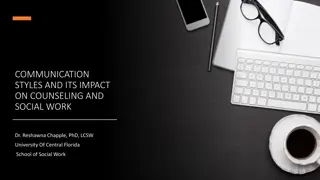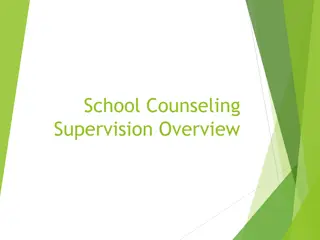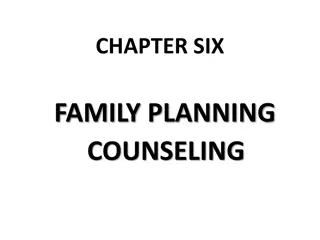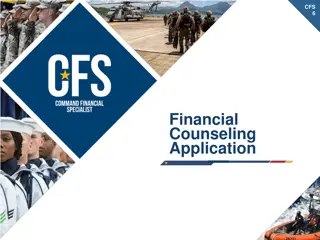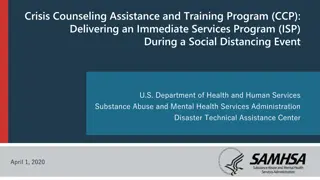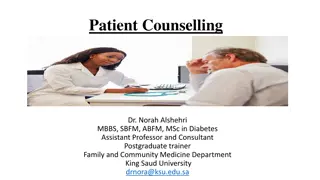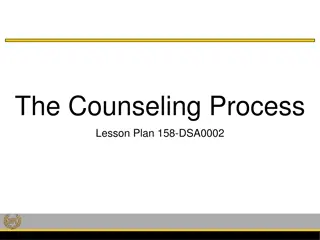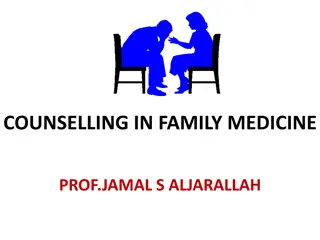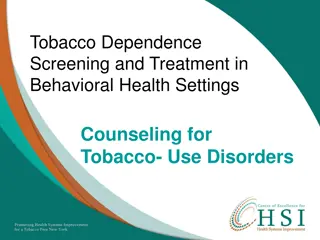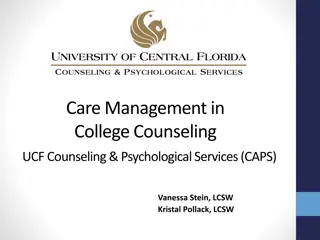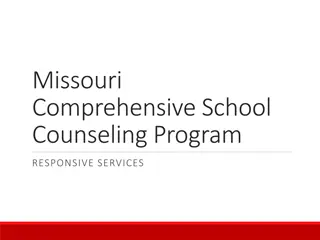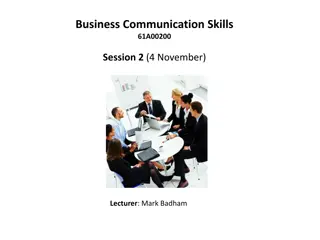Importance of Communication and Counseling Skills in Clinical Settings
Dr. Leena Baghdadi, an Assistant Professor and Clinical Epidemiologist, emphasizes the significance of effective communication and counseling skills in clinical practice. The content discusses the objectives of understanding these skills, barriers, and practical examples of counseling. Highlighted benefits include accurate problem identification, patient satisfaction, compliance with treatment, and reduced distress. Counseling is defined as a principled approach to fostering self-awareness and emotional growth. Effective communication and counseling contribute to improved patient care and reduced clinical errors.
Download Presentation

Please find below an Image/Link to download the presentation.
The content on the website is provided AS IS for your information and personal use only. It may not be sold, licensed, or shared on other websites without obtaining consent from the author. Download presentation by click this link. If you encounter any issues during the download, it is possible that the publisher has removed the file from their server.
E N D
Presentation Transcript
Tutorial: Communication & Counseling in Clinical Setting 1 Dr. Leena Baghdadi MBBS, Master CliEpi, PhD CliEpi Assistant Professor & Clinical Epidemiologist | Family & Community Medicine| College of Medicine | KSU Dr L Baghdadi March 2019
Objectives: 2 To understand the concepts of communication and counseling To learn why are communication& counseling skills important ? To learn the theories and stages of counseling What are the possible barriers ? Discuss one practical example of counselling Dr L Baghdadi March 2019
Why Communication & Counseling Skills? 3 When doctors use consultation & counseling skills effectively: Patients problems identified more accurately Patients more satisfied with their care Patients more likely to comply with treatment Patients distress & vulnerability to anxiety & depression are lessened Dr L Baghdadi March 2019
Why Communication/ Counseling Skills? 4 When doctors use consultation skills effectively Doctors and patients wellbeing is improved Few clinical errors are made Patients are less likely to complain Reduced likelihood of doctors being sued Dr L Baghdadi March 2019
CommunicationSkills 5 You often need to be bearers of the worst imaginable news You have to arrange complex and often uncertain information into something understandable You have to respond to differing needs of a hugely diverse range of patients and their families And you have to do much of this when you are busy and under pressure Dr L Baghdadi March 2019
6 What is Counseling? It is the skilled and principled use of relationship to help the patient develop self-knowledge, emotional acceptance and growth including personal resources Counselors who offer warmth and empathy are more effective Dr L Baghdadi March 2019
7 It is an opportunity to talk to a person in non- judgmental and supportive way. To better understand his/her current problems To identifies strategies to help problem solve. Dr L Baghdadi March 2019
8 Aims of counseling To help people accept and come to terms with their difficulties and identify ways of coping more effectively and resourcefully The counselor listens and asks questions until both counselor and client understand the way the client sees things The counselor enables the client to clarify thoughts and feelings for better understanding of the problem Dr L Baghdadi March 2019
9 Stages of Counseling Exploration: Enabling the patient to explore the problem himself and then focus on specific concerns New understanding: To see both, themselves and their situation in new perspectives and how to cope more effectively Goal setting Action: Possible ways to act ; costs/consequences, planning, implementation and evaluation ; creative thinking, problem solving and decision making Dr L Baghdadi March 2019
Deficiencies in Communication &Counseling 10 Doctors may not obtain enough information about patients perspective Provide information in inflexible way Pay little attention in checking how well patients have understood Less than half of patients psychological morbidity is recognized Dr L Baghdadi March 2019
Reasons for patients not disclosing problems 11 Belief that nothing can be done Reluctance to burden the Doctor Desire not to appear pathetic or ungrateful Concern that it is not legitimate to mention them Doctors blocking behavior Worry that their fears about what is wrong with them will be confirmed Lack of confidentiality and trust Dr L Baghdadi March 2019
The Evidence Base 12 54% of patient s problems & concerns not elicited (Stewart et al, 1979). Doctors frequently interrupted their patients soon after their opening statement (mean time 18 seconds) so patients subsequently failed to disclose significant (Beckman and Frankel, 1984). Failing to discover the patients feelings and concerns led to dysfunctional consultations and counselling (Byrne and Long, 1976). Dr L Baghdadi March 2019
What is a failed communication/ Counseling? 13 No rapport Using medical jargon Not exploring the patients agenda Not eliciting the actual problem No contingency plan No summarization Failing to clarify Not exploring in socio-cultural & economic context Dr L Baghdadi March 2019
Problems & Limitations in Communication & Counseling: 14 Shortage of time Language barrier low literacy Firm misconceptions and myths Lack of awareness Not ready to take responsibility for own illness Socio-cultural, economic barriers Fatalistic attitude (It s God s will) Dr L Baghdadi March 2019
Barriers to Communication/Counseling in Clinical Practice 15 Personal Barriers Lack of training: undergraduate/postgraduate Undervaluing importance of communication Focus only on treating diseases Personal Limitations Organizational Barriers Lack of time Pressure of work Interruptions Dr L Baghdadi March 2019
16 Good communication & counseling is good for doctors good for patients and good for the health service Dr L Baghdadi March 2019
Example 1 17 Dr L Baghdadi March 2019
Smoking Cessation Counselling 18 Domains to be assessed: A. Professional Behavior B. Data Gathering C. Management Dr L Baghdadi March 2019
Professional Behavior 19 Building Rapport Showing empathy Good posture Appropriate body language Avoids interruptions Dr L Baghdadi March 2019
Data Gathering 20 Exploring Smoking History : Number if cigarettes First cigarettes time Previous attempts to quit Motivation Smokers around the patients? Dr L Baghdadi March 2019
Data Gathering 21 General Health issues: Cardiovascular diseases Chronic cough Depression Any suicidal ideations, etc Opportunistic Screening: Blood Pressure, obesity, adolescent issues, stress, depression etc Dr L Baghdadi March 2019
Data Gathering 22 Exploring ICE : Idea: want to give up, any options available around ?? Concern: fear of lung cancer. Expectation: I might get some prescription to quit smoking Dr L Baghdadi March 2019
Management 23 Discuss different pharmacological and non- pharmacological issues Patient s ideas regarding medications Offering choices of Nicotine Replacement Therapy e.g. patches and gums Any cost issues to buy this treatment Agree on quit date Respect his treatment choice Involvement of smoking cessation clinics (with patient agreement) Follow up in 2 weeks after quit date Dr L Baghdadi March 2019
Competencies to cover 24 The OSCE will accomplish the assessment of the students in the following competencies : Patient education Undertaking of population healthcare in health system in Saudi Arabia Orientation to health services/providers in the community Applying bio-psycho-social approach in certain clinical and community encounters Health promotion and disease prevention in the community Role as a health advocate Apply general principles of communication skills Dr L Baghdadi March 2019
Example 2 25 Dr L Baghdadi March 2019
26 A 20 years old college student visits the health center for concerns over her increasing weight. You see that her BMI is greater than 30. How will you approach this student, within context of the 5A approach to counselling? Please use the attached file to answer the question. https://onlinelibrary.wiley.com/doi/full/10.3322/caac.21394 Dr L Baghdadi March 2019
Thank you 27 Dr L Baghdadi March 2019


